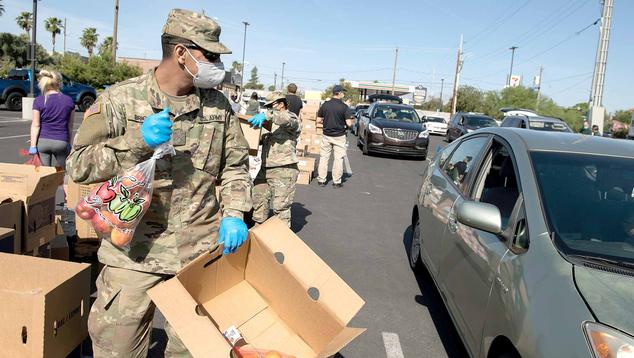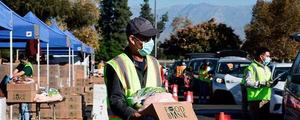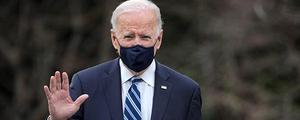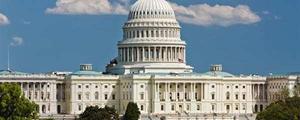Story Highlights
- 55% of Americans worry a great deal about hunger and homelessness
- 48% worry a great deal about race relations, up 17 points since 2020
- High-level worry about unemployment rose 15 points between 2019 and 2021
WASHINGTON, D.C. -- One year after the coronavirus pandemic upended Americans' lives and caused an economic crisis, worry about hunger and homelessness in the country eclipses concerns about 13 other national issues for the first time. The 55% of U.S. adults who say they personally worry "a great deal" about these consequences of poverty marks an eight-percentage-point increase since last year and the highest point in 20 years of measurement.
Meanwhile, the percentage of Americans highly worried about the economy has climbed 16 points, to 49%. A similar 15-point increase to 38% is seen in the public's worry about joblessness since 2019 (it was not included in the 2020 poll), which reflects the historic pandemic-fueled spike in the U.S. unemployment rate last spring. While the national unemployment rate has dropped since then, it remains higher than it had been for more than five years before the pandemic began.
Yet, it is not just COVID-19 that is behind substantial increases in the public's worry levels over the past year. The 17-point surge in high-level worry about race relations, to a record-high 48%, is likely owed to increased attention to racial injustice in the U.S. after the death of George Floyd while in police custody last May.
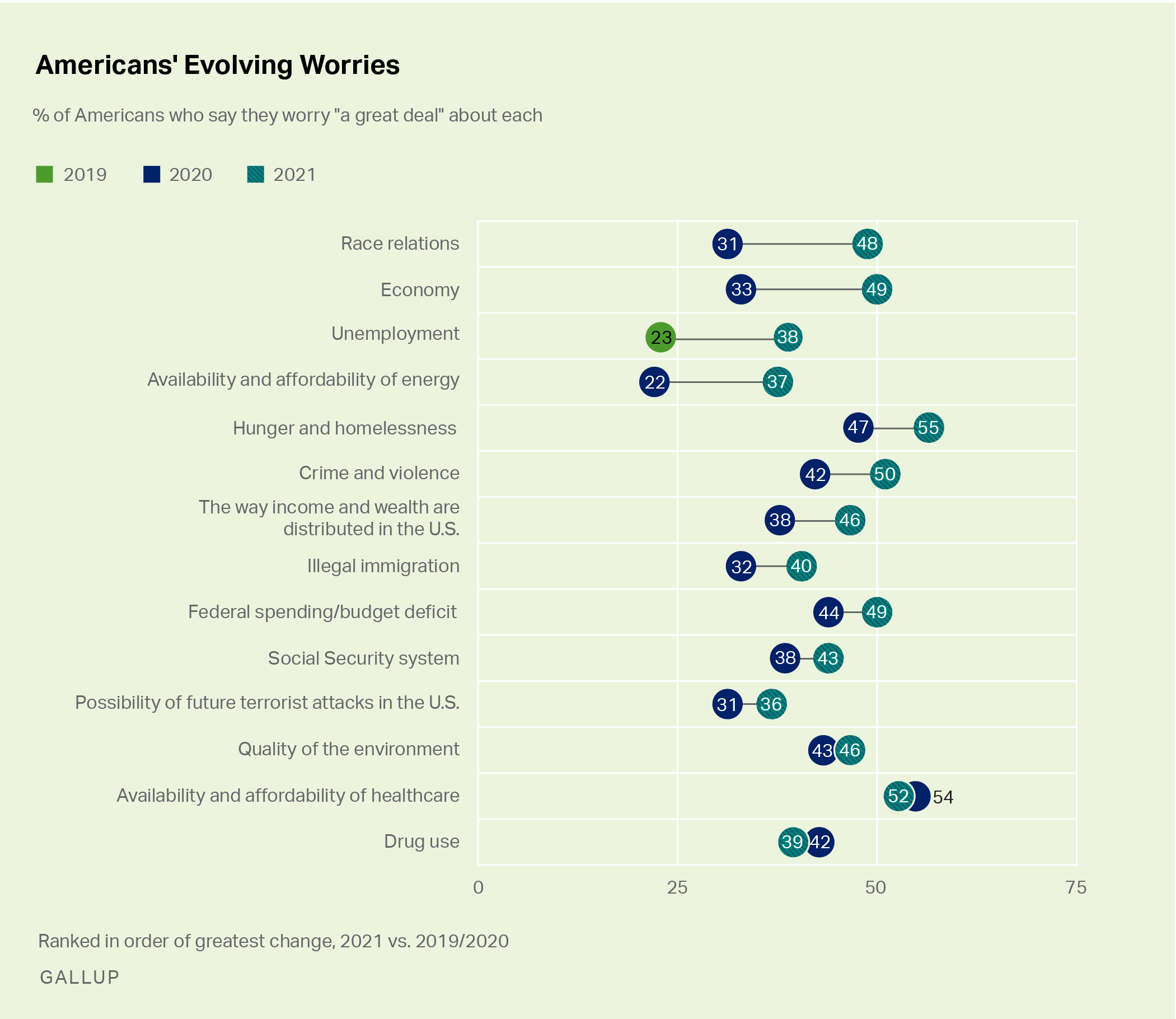
Graph showing the changes in worry about each of 14 national issues between 2019 and 2021 or 2020 and 2021. The greatest changes in worry between 2020 and 2021 were for race relations which rose 17 points, the economy which increased 16 points and 14 points for the availability and affordability of energy.
These latest data are from a March 1-15 Gallup poll, which also finds a 15-point surge to 37% in the percentage of Americans expressing a great deal of worry about the availability and affordability of energy. This increase comes in the wake of February's Texas power grid failure and steadily rising oil prices.
There are also eight-point increases in the percentages saying they worry a great deal about three other issues -- crime and violence (to 50%), the way income and wealth are distributed in the U.S. (to 46%), and illegal immigration (to 40%). Changes in worry about the remaining six issues are five points or less.
Hunger, Homelessness and Healthcare Top Worry List
While there have been significant changes in Americans' levels of worry about many of the 14 issues tracked, majorities say they worry a great deal about just two of them -- hunger and homelessness and the availability and affordability of healthcare in the U.S. However, majorities acknowledge at least "a fair amount" of worry about the other 12 issues.
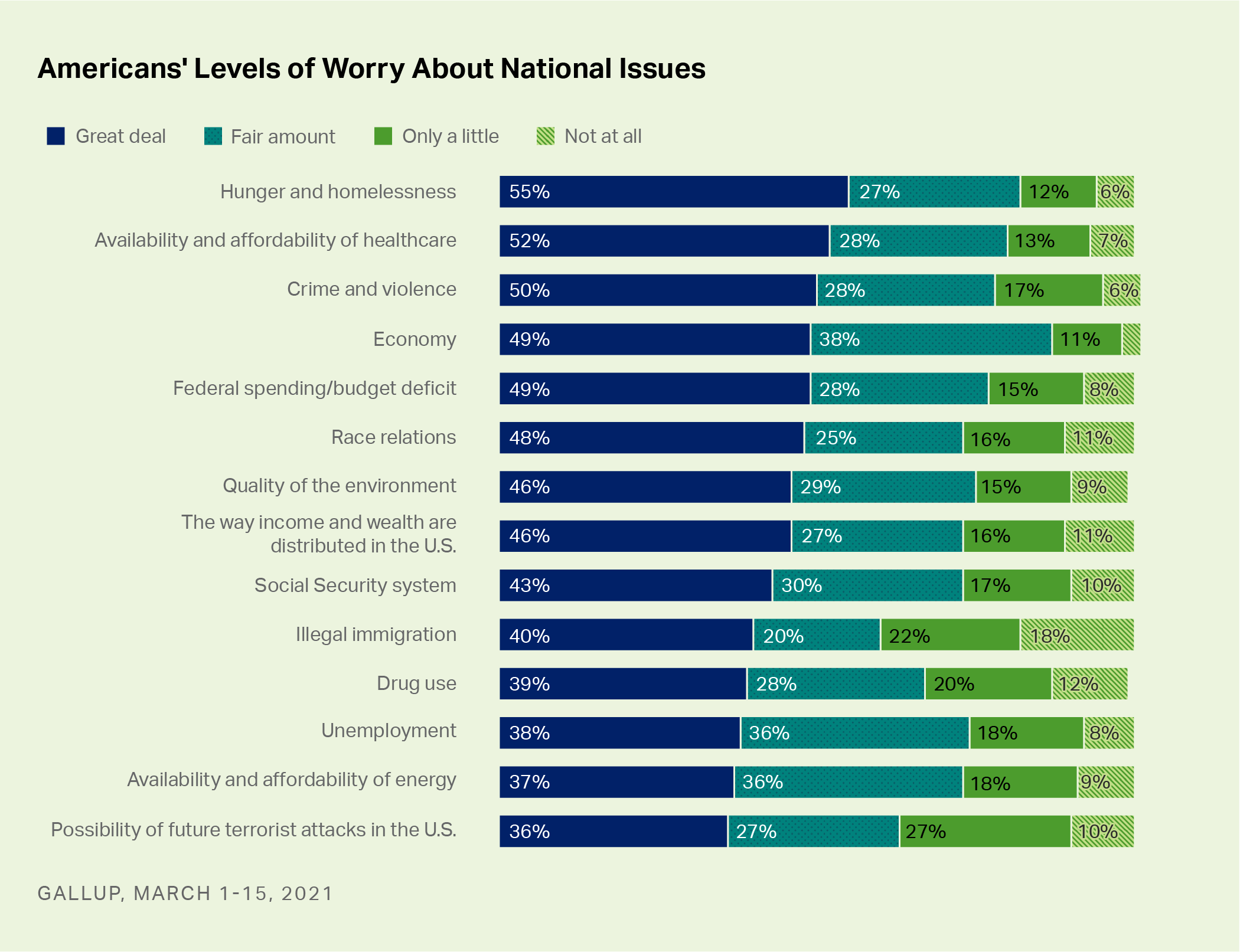
Bar chart. Americans' worry levels for each of 14 issues in March 2021. Americans express highest level of worry about hunger and homelessness and the availability and affordability of healthcare. Top-level worry is lowest for unemployment, availability and affordability of energy, and possibility of future terrorist attacks in the U.S.
In a year when the U.S. healthcare system has been overburdened by the pandemic, it is perhaps not surprising that the availability and affordability of healthcare is a top-level concern. In fact, it has been one of the top issues in most years since 2001, except for 2010 through 2013. Still, the 52% of U.S. adults who say they worry a great deal about this issue is the lowest on record -- by two points -- since 2001.
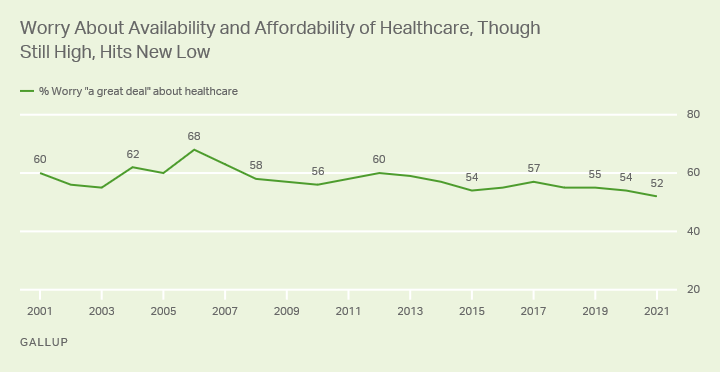
Line graph. Percentage of Americans who worry a great deal about the availability and affordability of healthcare since 2001. Currently, it is 52% which is the lowest on record. The highest, in 2006 was 68%.
The economy was the top concern between 2010 and 2013, the years that healthcare was not. In a few years, other issues tied healthcare or the economy for first, including crime in 2001 and 2016, the federal budget deficit in 2014, terrorism in 2015, and hunger and homelessness this year.
Partisan Differences in Levels of Worry
There is little common ground among partisans on these measures, with just two of the 14 issues garnering similarly high levels of worry from Republicans/Republican-leaning independents and Democrats/Democratic-leaning independents: Roughly four in 10 in each party group express a great deal of worry about drug use and unemployment.
Majorities of Republicans express a great deal of worry about illegal immigration, the federal budget deficit, the economy, and crime and violence. At the same time, majorities of Democrats say they are similarly worried about the quality of the environment, race relations, healthcare, hunger and homelessness, and the distribution of wealth.
The greatest difference in partisans' levels of worry is for illegal immigration. While partisans' views of illegal immigration are typically polarized, the latest gulf is particularly high -- and is likely due to President Joe Biden taking office and his administration's recent handling of the southern U.S. border.
Worry about federal spending and the budget deficit is similarly more polarized than in recent years, as Republicans are displeased with losing the White House to Biden and continue to express their opposition to the Biden administration's $1.9 trillion coronavirus relief package, which was signed into law during the poll's field period.
Concerns about the quality of the environment and race relations are likewise very polarized, but with Democrats expressing greater concern than Republicans. While the gap in partisans' levels of worry about race relations is similar to last year's, the gap in their levels of concern about the environment has narrowed by 18 points, as Republicans have become more worried and Democrats have become somewhat less worried with Biden in office.
| Republicans/Republican leaners | Democrats/Democratic leaners | Gap (Rep-Dem) | |||||||||||||||||||||||||||||||||||||||||||||||||||||||||||||||||||||||||||||||||||||||||||||||||
|---|---|---|---|---|---|---|---|---|---|---|---|---|---|---|---|---|---|---|---|---|---|---|---|---|---|---|---|---|---|---|---|---|---|---|---|---|---|---|---|---|---|---|---|---|---|---|---|---|---|---|---|---|---|---|---|---|---|---|---|---|---|---|---|---|---|---|---|---|---|---|---|---|---|---|---|---|---|---|---|---|---|---|---|---|---|---|---|---|---|---|---|---|---|---|---|---|---|---|---|
| % | % | pct. pts. | |||||||||||||||||||||||||||||||||||||||||||||||||||||||||||||||||||||||||||||||||||||||||||||||||
| Illegal immigration | 69 | 18 | +51 | ||||||||||||||||||||||||||||||||||||||||||||||||||||||||||||||||||||||||||||||||||||||||||||||||
| Federal spending/budget deficit | 75 | 28 | +47 | ||||||||||||||||||||||||||||||||||||||||||||||||||||||||||||||||||||||||||||||||||||||||||||||||
| Economy | 58 | 40 | +18 | ||||||||||||||||||||||||||||||||||||||||||||||||||||||||||||||||||||||||||||||||||||||||||||||||
| Availability/Affordability of energy | 45 | 31 | +14 | ||||||||||||||||||||||||||||||||||||||||||||||||||||||||||||||||||||||||||||||||||||||||||||||||
| Possibility of future terrorist attacks | 43 | 31 | +12 | ||||||||||||||||||||||||||||||||||||||||||||||||||||||||||||||||||||||||||||||||||||||||||||||||
| Social Security system | 48 | 37 | +11 | ||||||||||||||||||||||||||||||||||||||||||||||||||||||||||||||||||||||||||||||||||||||||||||||||
| Crime and violence | 53 | 44 | +9 | ||||||||||||||||||||||||||||||||||||||||||||||||||||||||||||||||||||||||||||||||||||||||||||||||
| Drug use | 40 | 37 | +3 | ||||||||||||||||||||||||||||||||||||||||||||||||||||||||||||||||||||||||||||||||||||||||||||||||
| Unemployment | 37 | 39 | -2 | ||||||||||||||||||||||||||||||||||||||||||||||||||||||||||||||||||||||||||||||||||||||||||||||||
| Hunger/Homelessness | 45 | 62 | -17 | ||||||||||||||||||||||||||||||||||||||||||||||||||||||||||||||||||||||||||||||||||||||||||||||||
| Income/Wealth distribution in U.S. | 36 | 54 | -18 | ||||||||||||||||||||||||||||||||||||||||||||||||||||||||||||||||||||||||||||||||||||||||||||||||
| Availability/Affordability of healthcare | 41 | 62 | -21 | ||||||||||||||||||||||||||||||||||||||||||||||||||||||||||||||||||||||||||||||||||||||||||||||||
| Race relations | 31 | 64 | -33 | ||||||||||||||||||||||||||||||||||||||||||||||||||||||||||||||||||||||||||||||||||||||||||||||||
| Quality of the environment | 26 | 61 | -35 | ||||||||||||||||||||||||||||||||||||||||||||||||||||||||||||||||||||||||||||||||||||||||||||||||
| GALLUP, March 1-15, 2021 | |||||||||||||||||||||||||||||||||||||||||||||||||||||||||||||||||||||||||||||||||||||||||||||||||||
Bottom Line
Gallup's annual update gauging Americans' levels of worry about a host of national problems finds marked changes reflecting the challenging events of the past year. Many Americans found themselves in dire circumstances due to the pandemic, and food banks and soup kitchens were stretched thin. For the first time in two decades, a majority of Americans now say they worry a great deal about hunger and homelessness.
Likewise, concerns about racial injustice that overtook the nation after George Floyd's death while in police custody drove Americans' worry about race relations to a record-high level. Partisans' disparate levels of worry reinforce the reality that those on opposite sides of the political aisle view American society in sharply different ways, influenced to a large degree by which party's president occupies the White House.
Learn more about how the Gallup Poll Social Series works.
